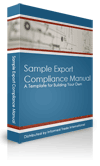Penalties for ITAR Noncompliance
The International Traffic in Arms Regulations (ITAR) implemented by the State Department’s Directorate of Defense Trade Controls – in combination with the Export Administration Regulations (EAR) implemented by the Department of Commerce – applies controls to the export/import of defense articles and defense-related services. Though necessary, the regulations set up by ITAR places a heavy burden on covered exporters. Compliance can be a rather complicated matter given the numerous and varied controls, and the dynamic nature of ITAR regulation, and penalties are often severe.
Legal compliance requires constant monitoring of the state of ITAR regulation. As new regulations are implemented (and old regulations are amended), covered exporters must adapt or risk being penalized for noncompliance.
ITAR contemplates the ever-changing landscape of defense article export/import regulation, and places restrictions on covered exporters to ensure that there is sufficient organizational infrastructure to maintain compliance. Exporters of defense articles and defense-related services must employ a dedicated compliance officer to serve as an Empowered Official (see ITAR section 120.25). Compliance departments are recommended for larger exporters.
Empowered Officials not only function as the legal agent of the cover exporter for executing applications and approvals, verifying deal information, and conducting compliance inquiries, but are also responsible for keeping up with compliance requirements and penalties.
As compliance infrastructure is required by law, the penalties for noncompliance are correspondingly significant to incentivize further development of efficient internal compliance systems. Under the ITAR, even “mistaken” – not willful – compliance failures are met with heavy penalties.
Typical Compliance Violations
Even exporters with excellent compliance programs may violate ITAR law on occasion. The following is a non-exhaustive list of compliance violations that are commonly seen.
Willful Failure to Comply with ITAR
Knowing and willful violation of various ITAR provisions may result in both civil and criminal penalties worth millions of dollars (and depending on the violation, may result in imprisonment). If an exporter becomes aware of an applicable ITAR provision, they must comply. If they fail to comply after becoming aware of the applicable provision(s), they risk being found in willful violation of the law.
Unintended Mistake
Unintended mistakes are common in the ITAR exporter industry, given the complexity and breadth of applicable regulations. Mere mistakes are generally subject to significant civil penalties, but it’s worth noting that ITAR provides an alternative disclosure program that allows for reduced/no penalties if certain stringent reporting requirements (along with adequate restructuring of the compliance process) are met.
Misrepresentation and Factual Omissions
Noncompliance does not require violation of any specific compliance provisions of ITAR. If an exporter makes a factual omission of material information (or otherwise misrepresents facts) at any point in the registration, licensing, or reporting processes, then civil and criminal penalties may apply. Absolute honesty and accuracy is a non-negotiable requirement.
Penalties for Compliance Violations
Strategically speaking, exporters have nothing to gain and everything to lose from noncompliance. ITAR enforcement is exceptional, and the State Department collaborates with a number of domestic and foreign agencies to closely monitor compliance at every stage of the export process. Penalties are severe, with certain violations risking criminal penalties (including imprisonment) and/or debarment of the business itself.
Criminal penalties include fines of up to $1 million and up to 10 years imprisonment. Exporters found in violation of ITAR are generally only subjected to criminal penalties for willful noncompliance.
Civil penalties are more common, but in monetary terms, no less severe.
As of August 1, 2016, civil ITAR violations may result in monetary penalties up to $1.09 million in value (per violation). This inflation-adjusted penalty ceiling will be adjusted on an annual basis every January.
Civil penalties apply to each individual violation. A single locus of noncompliance can in fact be broken down into multiple violations, resulting in penalties in the range of tens of millions of dollars.
For example, suppose that an exporter mistakenly approves of delivery of defense articles to a particular destination. The destination control statement is also full of factual inaccuracies concerning the ultimate destination of the defense articles. Further, because the inaccuracies were not caught early, many different shipments of different defense articles were delivered. Though all of these violations arise from the same general mistake (regarding the ultimate destination), multiple violations were committed. The exporter in this situation may be subject to tens of millions of dollars in civil monetary penalties.
Importantly, civil penalties may be reduced at the discretion of the governing agency, but the exporter must adequately demonstrate that such reduction is justified by the weight of evidence.
Potential Debarment
Substantial monetary penalties can – in some cases – be absorbed by successful export businesses with the assets necessary to pay such penalties. On the other hand, debarment can ruin an established defense article exporter, no matter the success of the business or the availability of monetary assets.
Debarment is required when exporters violate the Arms Export Control Act (AECA). It is not required – but may be invoked by regulators – for ITAR violations.
Debarment results in the loss of ITAR export licensing privileges. Further, if the debarred exporter has any government contracts, those contracts are rendered forfeit. Debarment could spell the end of a successful exportation business. After debarment, the exporter will be placed on a federal debarred list – other businesses will thus be put on notice not to do business with the debarred exporter.
Debarment prevents both direct and indirect participation in the exportation of defense articles. The debarred business cannot participate at any step of the exportation process.
Debarment is not necessarily final, however. After some time, specific exceptions may be approved to allow debarred exporters to participate again in a limited capacity.
—
Though ITAR compliance can be difficult to consistently implement and maintain, it is a crucial requirement for the successful, long-term exportation of defense articles. ITAR noncompliance brings with it severe criminal and civil penalties that can end an export business.
Posted on November 3rd, 2016 by admin
Filed under: ITAR

